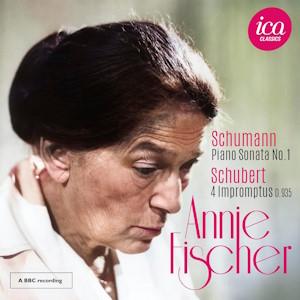
Robert Schumann (1810-1856)
Piano Sonata No.1 in F sharp minor, Op.11 (1833-35)
Franz Schubert (1797-1828)
Four Impromptus, D935 (1827)
Annie Fischer (piano)
rec. March 1975, BBC Studios, Broadcasting House, London
ICA Classics ICAC5178 [62]
Annie Fischer was in London in March 1975 to give a recital at the Queen Elizabeth Hall. According to the BBC Archives she also seems to have played two Mozart Concertos, K466 and K467, at the Royal Festival Hall with Harry Blech and the London Mozart Players during that month. ICA Classics releases, for the first time on CD (it announces), the studio broadcasts she made at Broadcasting House, London on 12 March, where she played the Schumann Sonata, Op.11 and 20 March where she played Schubert’s Impromptus D.935. The Schumann was first broadcast on Radio 3 on 19 June and Schubert’s Impromptus on 12 October. The other works she took into the studio were Brahms’ Sonata No.3, a 1961 Edinburgh Festival performance of which has been released on BBC Legends BBCL4054-2, which she coupled with the Schubert, and Beethoven’s 32 Variations in C minor – an earlier BBC performance of which, from 1963, has already been released on BBC Legends BBCL4166-2 (review). Hence the focus here on Schumann and Schubert.
Fischer was an outstanding musician – unshowy, unflappable, but dynamically engaged in live performances, such as can be heard in these performances. Schumann’s First Sonata, Op.11 was not in every pianist’s repertoire, then or now, but in more recent times it’s been taken up by players of the stature of Pollini (a touch cool), Schiff (laboured) and Perahia (warmly lyric). There is in fact another Fischer broadcast in existence from the Franz Liszt Academy in 1978 on Hungaroton but in rather washed-out sound. This ICA is substantially better and sounds attractive and Paul Baily has remastered it to good effect. Fischer plays with great authority and it’s no surprise that she is swifter than any of the other trio of pianists I cited and whilst a minute’s difference might not seem anything to draw attention to, it’s her incisive articulation and her rhythmic dynamism, as well as the liquidity of her poetic responses, that vest this performance with such distinction. Her beautiful refinement in the Aria is balanced by the aerated textures she draws from the Scherzo where she negotiates some tricky leaps with aplomb. It’s no surprise, either, that the finale is kept fluid and structurally tight.
She performed the Impromptus often in her career but not necessarily as a set. Indeed, for EMI she only recorded two of the four. Nevertheless, there are a relatively large number of surviving examples of her in these Impromptus. She largely ignored the D.899 set though the last time I checked there was a solitary surviving example of one of that set, recorded surreptitiously in concert. A rival broadcast is on the Hungaroton disc already cited but it’s not in the best sound. A far more plausible rival is on Meloclassic, from a Paris broadcast very early in 1959 which whilst not opulent sonically is still very clear. In London she plays the set of four with characteristic imagination and sense of colour. There’s hardly any difference between her tempi and those of her 1960 EMI recordings of Nos. 2 and 4 but there are differences between her Paris session the previous year. She is slightly faster in Paris, crisper and a touch more playfully engaged. Perhaps the fact that it was New Year in Paris helped things along. I rather prefer the Paris studio recording too despite the fact that it was made 16 years earlier. It’s certainly dryer than the BBC set-up but the BBC sound is a touch splintery in fortes and can spread a little. Nothing disastrous, of course.
Jonathan Summers provides his customarily excellent notes.
Any surviving examples of the art of Annie Fischer are to be welcomed even if they duplicate things that already exist. It’s a function of her repertoire that she focused on pieces most congenial to her and of which she felt she could give of her best.
Jonathan Woolf
Help us financially by purchasing from



















